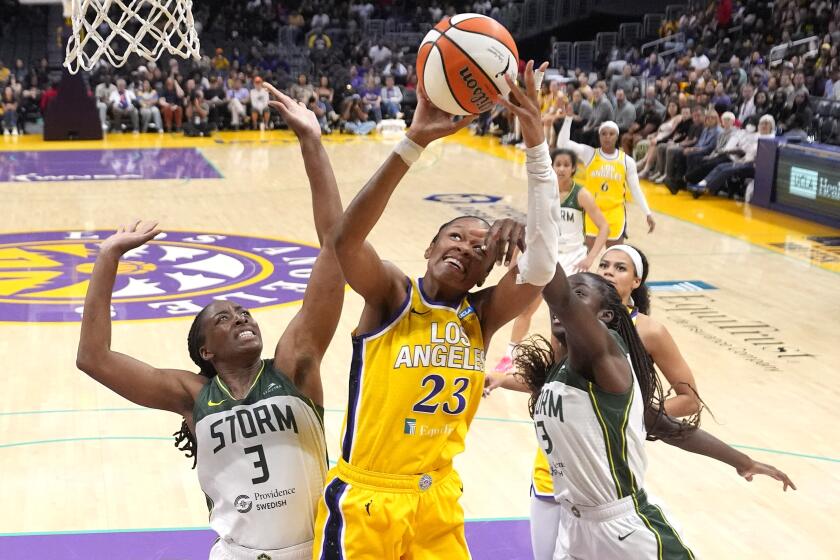Dodgers’ Frank McCourt will seek owners’ support, but shouldn’t expect it
There will be pleasantries. How was your flight? Where are you staying? How about those Cleveland Indians?
And then those conversations could turn awkward, the trapped-in-an-elevator kind of awkward, as Frank McCourt pitches his case to a fellow owner in the hallway.
Eight votes out of 30. That is all McCourt needs to tell Bud Selig what he can do with his trustee, all the Dodgers owner needs to keep his team and get his television money and send the commissioner back to Milwaukee a defeated man.
If McCourt gets a vote from any owner besides himself, call it an upset.
No vote is expected to be taken on the Dodgers on Wednesday or Thursday, as McCourt and the other 29 owners gather for their quarterly meeting at the New York headquarters of Major League Baseball. The Dodgers are not on the agenda.
Yet McCourt needs support, and fast. If he cannot make payroll — and he does not now have the cash to meet the Dodgers’ May 31 payroll — Selig could strip McCourt of his team with the approval of three-fourths of the owners.
McCourt makes a reasonable case for selective enforcement. Selig approved a loan for the New York Mets, but not the Dodgers. He approved a regional sports network in one form or another for the Mets and other teams, but not the Dodgers. He decided the Dodgers had too much debt, but he let the Mets slide. He met with the owners of the financially troubled New York club and spoke highly of them; he did neither for McCourt.
Selig has reasons for acting as he did, reasons that go far beyond any comparisons to the Mets. But he would rather not offer them under oath. If McCourt files suit and alleges Selig has abused his vast powers, a judge could decide McCourt deserves to be heard, even though Selig would demand the case be thrown out because every owner must agree not to sue the commissioner.
That would give McCourt the kind of leverage he lacks with his fellow owners.
Selig is 76. He was not born the last time MLB stripped an owner of his team, in 1912, when the Philadelphia Phillies’ Horace Fogel was banished for repeatedly impugning the integrity of umpires and opponents.
McCourt is convinced that Selig’s investigation of the Dodgers will extend “two weeks beyond him running out of money,” in the words of one person close to McCourt. If the outcome is “predetermined,” as McCourt has said, it is not one Selig has reached lightly.
Selig could face hard questions on the Dodgers during this meeting. He works for the owners, after all, and he has not sent them a memo explaining why he took over the Dodgers, according to several people who would have received one. He has secured the approval of the executive council — an inner circle of eight owners — but has yet to clarify to all why they should not fear a takeover.
So Selig will work the halls. So will Tom Schieffer, MLB’s Dodgers trustee.
McCourt will work the halls too. However, seven years into his Dodgers tenure, McCourt has not developed the strong personal and collegial relationships within the game that can be so critical to surviving an ownership crisis.
Selig vaulted into the commissioner’s office on those kinds of relationships. Schieffer, the former president of the Texas Rangers, has nurtured them. So has Fred Wilpon, the Mets’ principal owner.
Selig’s executive staff now includes Joe Torre and Charles Steinberg, two of the many former McCourt employees, men with allies all over baseball.
No owner has spoken up for McCourt, and many have wondered why the Dodgers’ owner and his people have so loudly protested against Schieffer and his investigators when McCourt has pledged to be compliant and transparent.
“If what you say is true, then just give them everything they want and help them get it,” said one major league owner, declining to be identified because of the potential litigation. “It just seems like they’re going on complete offense against the league.”
Among baseball’s owners, McCourt appears to have what the Lakers’ Andrew Bynum would call “trust issues.”
Some owners did not appreciate McCourt and his ex-wife, Jamie McCourt, contesting their divorce so publicly and bitterly. The revelations about all that spending on estates and hairdressers and private jets have threatened the credibility of every other owner who pledges to funnel profits back into his team.
The owners were disturbed to read that McCourt had set up a mechanism by which the Dodgers paid rent to play in a stadium they owned, millions of dollars that might otherwise have gone toward baseball’s revenue-sharing plan. The owners were more disturbed to learn that the league had approved the mechanism, apparently without the due diligence that Schieffer has now been installed to provide.
The owners grew concerned when McCourt proclaimed he had stadium security under control after the Bryan Stow beating, only to see the Los Angeles Police Department temporarily take over and Selig dispatch a six-man task force. The owners do not need fans wondering whether their favorite team employs a full-time head of security, since the Dodgers had left the position vacant for four months.
The owners are astonished that McCourt needed a loan to make his first payroll of the season, even more surprised by the plummeting attendance at Dodger Stadium, all those empty seats meaning millions more dollars disappearing from the revenue-sharing pool.
One major league owner referred to it as a “fan boycott.”
McCourt has asked the fans for a second chance. He might well ask the owners for a second chance. Not much chance either way.
twitter.com/BillShaikin
More to Read
Go beyond the scoreboard
Get the latest on L.A.'s teams in the daily Sports Report newsletter.
You may occasionally receive promotional content from the Los Angeles Times.











